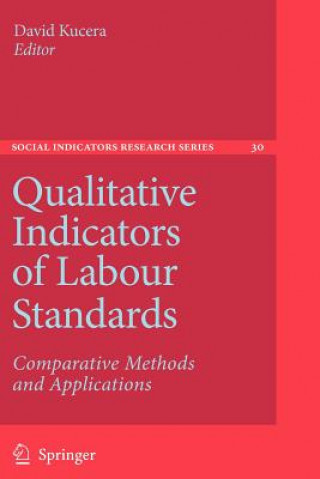
Dostawa
Doradca ds. zakupów





Jednak się nie przyda? Nic nie szkodzi! U nas możesz zwrócić towar do 30 dni
 Bon prezentowy
O dowolnej wartości
Bon prezentowy
O dowolnej wartości
Bon prezentowy to zawsze dobry pomysł. Obdarowany może za bon prezentowy wybrać cokolwiek z naszej oferty.
Qualitative Indicators of Labour Standards
 Angielski
Angielski
 304 b
304 b
 common.delivery_to
common.delivery_to
30 dni na zwrot towaru


Recent years have witnessed a rapidly growing interest in the use and construction of "qualitative" indicators of labour standards. Qualitative indicators, while generally having numerical values, are based on such methods as grading by experts, the coding of legislation, and the coding of other textual sources addressing violations of a more de facto nature. Measuring compliance with labour standards is an undertaking intrinsically fraught with difficulty. For there are a number of possible sources of measurement error, both random and non-random, that are unique to such indicators, on top of those that affect qualitative and quantitative indicators alike. The growing use of qualitative indicators of labour standards thus raises a number of questions about comparative methods of construction as well as the appropriateness of particular methods for particular applications. This volume results from a seminar that was organized by the International Labour Office (ILO) to address these and related questions, bringing together experts from the ILO, universities and NGOs.Recent years have witnessed a rapidly growing interest in the use and construction of "qualitative" indicators of labour standards. This is likely attributable to several factors: the rise of "socially responsible" investment, ongoing debates on the effects of labour standards on international competitiveness, and the sense that traditional quantitative indicators of labour standards are too narrow in scope to adequately capture the wide-ranging and inherently qualitative nature of many aspects of labour standards. Qualitative indicators, while generally having numerical values, are based on such methods as grading by experts, the coding of legislation, and the coding of other textual sources addressing violations of a more de facto nature. Measuring compliance with labour standards is an undertaking intrinsically fraught with difficulty. For there are a number of possible sources of measurement error, both random and non-random, that are unique to such indicators, on top of those that affect qualitative and quantitative indicators alike. The growing use of qualitative indicators of labour standards thus raises a number of questions about comparative methods of construction as well as the appropriateness of particular methods for particular applications. This volume results from a seminar that was organized to address these and related questions.Recent years have witnessed a rapidly growing interest in the use and construction of "qualitative" indicators of labour standards. This volume results from a seminar that was organized to address these and related questions. The contributions offer a unique comparative critique of the progress toward standards. Contributors include academic experts as well as lawyers, social scientists and NGO experts who have done significant work on labour standards.
Informacje o książce
 Angielski
Angielski
Kategoria




 Jak kupować
Jak kupować














